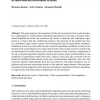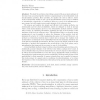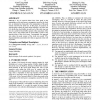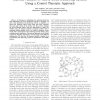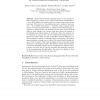117
click to vote
TMC
2008
15 years 2 months ago
2008
Mutual network synchronization is a distributed method in which geographically separated clocks align their times to one another without the need of reference or master clocks. Mut...
113
click to vote
TCAD
2008
15 years 2 months ago
2008
Abstract--Advances in very large-scale integration technology make clock skew more susceptible to process variations. Notwithstanding efficient exact zero-skew algorithms, clock sk...
111
Voted
RTS
2006
15 years 2 months ago
2006
This paper proposes the integration of internal and external clock synchronization by a combination of a fault-tolerant distributed algorithm for clock state correction with a cent...
150
Voted
ALGORITHMICA
2007
15 years 2 months ago
2007
We study the problem of providing a sensor with an accurate estimate of the time, from a novel perspective which is complementary to the well-studied clock synchronization problem....
150
click to vote
FAST
2004
15 years 3 months ago
2004
CLOCK is a classical cache replacement policy dating back to 1968 that was proposed as a low-complexity approximation to LRU. On every cache hit, the policy LRU needs to move the a...
107
Voted
CONCUR
2008
Springer
15 years 4 months ago
2008
Springer
Abstract. We propose a model of distributed timed systems where each component is a timed automaton with a set of local clocks that evolve at a rate independent of the clocks of th...
119
click to vote
DAC
2005
ACM
15 years 4 months ago
2005
ACM
Although a lot of research efforts have been made in the minimization of the total power consumption caused by the clock tree, no attention has been paid to the minimization of th...
122
Voted
ASPDAC
2005
ACM
15 years 4 months ago
2005
ACM
— In this paper, a methodology for analyzing closed loop clock distribution and active deskewing networks is proposed. An active clock distribution and deskewing network is model...
143
click to vote
APLAS
2008
ACM
15 years 4 months ago
2008
ACM
ion of Clocks in Synchronous Data-flow Systems Albert Cohen1 , Louis Mandel2 , Florence Plateau2 , and Marc Pouzet23 1 INRIA Saclay - Ile-de-France, Orsay, France 2 LRI, Univ. Pari...
131
click to vote
USS
2008
15 years 4 months ago
2008
The Tor anonymisation network allows services, such as web servers, to be operated under a pseudonym. In previous work Murdoch described a novel attack to reveal such hidden servi...

